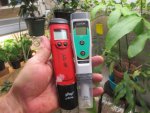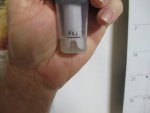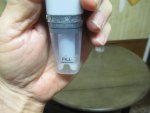You are using an out of date browser. It may not display this or other websites correctly.
You should upgrade or use an alternative browser.
You should upgrade or use an alternative browser.
PH
- Thread starter HARV
- Start date
Good question.
I'm in similar spot - tomatoes in containers with pH around 7. Debating whether to do something or just let them be.
Ammonium sulfate can be harmful, from what I've read. It contains a lot of nitrogen, and excess nitrogen can contribute to blossom end rot in tomatoes.
Apparently something like Espoma's Soil Acidifier is more plant friendly, alas these things can take months to lower the pH - by that time, the tomato growing season may be over.
I've read that one quick way to increase acidity is to water your plants with highly diluted vinegar (or apple cider vinegar) a few times, but again, I don't want to cause any harm since vinegar is used to kill weeds if used in higher concentrations.
Curious to hear from others what they recommend to quickly increase acidity in containers.
I'm in similar spot - tomatoes in containers with pH around 7. Debating whether to do something or just let them be.
Ammonium sulfate can be harmful, from what I've read. It contains a lot of nitrogen, and excess nitrogen can contribute to blossom end rot in tomatoes.
Apparently something like Espoma's Soil Acidifier is more plant friendly, alas these things can take months to lower the pH - by that time, the tomato growing season may be over.
I've read that one quick way to increase acidity is to water your plants with highly diluted vinegar (or apple cider vinegar) a few times, but again, I don't want to cause any harm since vinegar is used to kill weeds if used in higher concentrations.
Curious to hear from others what they recommend to quickly increase acidity in containers.
- Joined
- Oct 8, 2017
- Messages
- 6,899
- Reaction score
- 5,070
- Location
- Birmingham, AL USA
- Hardiness Zone
- 8a
- Country

I broke the aluminum sulphate down for someone potting and his surface area per pot was roughly 3\4 of a square foot. There are some instruction on the bag as to how much to use. In that persons case it came out to be a teaspoon or so as I recall.
- Joined
- Feb 21, 2020
- Messages
- 1,550
- Reaction score
- 504
- Country

I don't put anything on anything I eat period. How do you know your pH is 7? If you are using a probe pH tester you stick in the soil they are not accutite and will give mis readings. The best way to check the pH of the soil is by using a liquid pH meter and test the discharge water from the bottom of the container. Ammonium sulfate is poison when used in containers and i would never ever add it to my containers. Here's a photo of the pH meters that work with 98% accuracy and I recommend them to anyone that uses container culture horticulture.
Attachments
Would one of these inexpensive ones be good enough?The best way to check the pH of the soil is by using a liquid pH meter and test the discharge water from the bottom of the container.
- Joined
- Feb 21, 2020
- Messages
- 1,550
- Reaction score
- 504
- Country

Those will work pretty good, but I would get one that costs a little more. All these type pens have to have the electrode stored in a storage solution while not in use. The cheap ones lack a chamber for storage solution. If you look at the ones I use, you can see the bottom chamber that I put storage solution in while in storage. If you allow the electrode to get dry it will hurt the meter and have to be calibrated. Here's a photo of the storage with solution in it and the red one also has a storage in the black bottom. I had the Hanna for over 5 years and it's still very accurate. pH matters in container culture.
Attachments
- Joined
- Mar 26, 2013
- Messages
- 3,476
- Reaction score
- 1,531
- Location
- Port William
- Showcase(s):
- 1
- Country

If your soil really is only a hair over 7, your tomatoes will be ok, so if you do want to lower it a bit, the slow routes will be fine..
- Joined
- Feb 21, 2020
- Messages
- 1,550
- Reaction score
- 504
- Country

You can lower the pH with peat moss added to the mix because peat moss has a pH of 3.5 to 4.5! Using peat moss will increase the CEC in the soil and will boost the nutrient absorption. CEC "Cation Exchange Capacity" is extremely important in container culture. Peat moss is a a super amendment for pH modification and is not poison. Ammonium sulfate will lower the pH but if used the soil will become toxic! Please go to and read the following: https://pubmed.ncbi.nlm.nih.gov/10371046/, before you ever use Ammonium Sulfate in a plant containers again.
Thanks, all.
Just so I'm clear, Espoma Soil Acidifier is not ammonium sulfate, correct?
Just so I'm clear, Espoma Soil Acidifier is not ammonium sulfate, correct?
- Joined
- Oct 8, 2017
- Messages
- 6,899
- Reaction score
- 5,070
- Location
- Birmingham, AL USA
- Hardiness Zone
- 8a
- Country

Thanks, all.
Just so I'm clear, Espoma Soil Acidifier is not ammonium sulfate, correct?
From the espoma website.
When you do that test, do you water the plant with distilled water or just regular tap water that you normally use?The best way to check the pH of the soil is by using a liquid pH meter and test the discharge water from the bottom of the container.
- Joined
- Oct 8, 2017
- Messages
- 6,899
- Reaction score
- 5,070
- Location
- Birmingham, AL USA
- Hardiness Zone
- 8a
- Country

Great question. Tap water has been treated to have a more nuetral pH generally because as you know acids disolve metals and as a result will destroy metal pipe over time while all the metal goes out your tap. Distilled water is much like rain, generally should read 6 ph instead of 7 pH like tapwater. The problem with using tapwater is a measurement called the buffer. Should I use 1 pound or 10 pounds of a neutralizing compound in water, the pH will remain the same, but my ability to change the pH is reduced because of the buffer effect since there is more mass of neutralizer in one sample than in the other. I would have to match that mass to effect change. On the other hand you will not be ordering special glacier water for your plants so I would think measuring what you are normally doing would be appropriate.When you do that test, do you water the plant with distilled water or just regular tap water that you normally use?
Thanks. According to my pH tester, my distilled water is 6.1 and my tap water is 7.7.Distilled water is much like rain, generally should read 6 ph instead of 7 pH like tapwater.
- Joined
- Mar 26, 2013
- Messages
- 3,476
- Reaction score
- 1,531
- Location
- Port William
- Showcase(s):
- 1
- Country

Your tap water is alkalised by the soil type.Thanks. According to my pH tester, my distilled water is 6.1 and my tap water is 7.7.
Rainwater is usually lower @ ~5.6
- Joined
- Oct 8, 2017
- Messages
- 6,899
- Reaction score
- 5,070
- Location
- Birmingham, AL USA
- Hardiness Zone
- 8a
- Country

Environmental effects from the soil the aquifer flows through and over to the cities windard of your location spewing pollution causing acid rain. I wonder if rain on one side of the Rocky Mts is more or less acidic than on the other?Your tap water is alkalised by the soil type.
Rainwater is usually lower @ ~5.6
Forum statistics
Latest Threads
-
Happy Saint George's Day
- Started by zigs
-
Noob at growing lettuce, 1 is dying, dunno why
- Started by 2jjg4
-
Trying to find Gardeners with a Social Media presence to partner with
- Started by klaychop
-
Indeterminate Cheapness of Tomatos?
- Started by gunslingor
-
Summer Crops
- Started by Sas02
-
Mushrooms
- Started by Esther Knapicius
-
Old Westbury Garden Pine Tree identification
- Started by CLIVIAJOHN
-
Don't Know
- Started by big rockpile
-
Identify plant
- Started by Kurvertp



